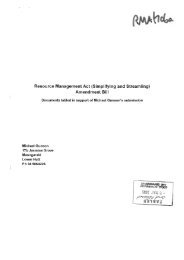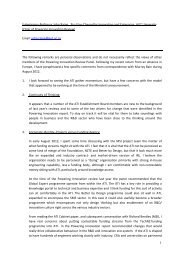Full paper text [PDF 3515k] - New Zealand Parliament
Full paper text [PDF 3515k] - New Zealand Parliament
Full paper text [PDF 3515k] - New Zealand Parliament
Create successful ePaper yourself
Turn your PDF publications into a flip-book with our unique Google optimized e-Paper software.
CASE STUDY<br />
14<br />
CASE STUDY:<br />
Treatment of woman with cancer<br />
by natural therapist/iridologist<br />
A woman consulted an iridologist and<br />
natural health practitioner about a lesion<br />
on her head, which the woman thought<br />
was a cyst. The provider recognised<br />
that the lesion “looked cancerous” and<br />
that it was beyond her ability to treat.<br />
However, the provider treated the woman<br />
over a period of 18 months. Treatment<br />
of the lesion included picking out dead<br />
skin, cleaning the lesion, and the use<br />
of topical and oral remedies. Although<br />
initially the lesion appeared to improve,<br />
it subsequently deteriorated. In order to<br />
treat the woman, the provider spent many<br />
hours at the woman’s house each day, and<br />
the woman and provider went on holiday<br />
together. The lesion grew larger and was<br />
frequently infected. It bled frequently, and<br />
smelled unpleasant. The woman became<br />
weak and was in severe pain. No other<br />
health practitioner treated the woman’s<br />
lesion during the 18 months.<br />
By the time the woman sought hospital<br />
treatment, the lesion was 10 x 11 cm and<br />
some underlying bones were damaged.<br />
The woman was diagnosed with cancer<br />
and underwent major surgery but, sadly,<br />
she died a year later.<br />
The provider was aware that the lesion<br />
was likely to be cancerous, but did not<br />
inform the woman of her opinions about<br />
the severity of the woman’s condition<br />
or that the lesion was worsening<br />
during the course of the treatment. The<br />
provider knew that she had exceeded<br />
the limits of her expertise and that the<br />
woman required advice from another<br />
practitioner, but she did not appropriately<br />
communicate this or discontinue her<br />
treatment of the woman. In addition, the<br />
provider gave the woman information<br />
which accentuated the woman’s fear of<br />
conventional treatment.<br />
The provider did not maintain any records,<br />
misled the woman about her training,<br />
and developed a friendship which<br />
compromised the care she provided<br />
the woman.<br />
The provider was found to have breached<br />
Rights 4(2), 4(4), 4(5), 6(1), 6(1)(a) and 7(1)<br />
of the Code, and was referred to the<br />
Director of Proceedings. The Director<br />
decided to issue an HRRT proceeding,<br />
which is pending.<br />
This case highlights the need for health<br />
providers to seek another provider’s<br />
advice when faced with a situation that<br />
is beyond their expertise, or where the<br />
relationship between practitioner and<br />
consumer goes beyond a professional<br />
one. It also highlights the need for<br />
careful documentation of the history and<br />
treatment, particularly if the consumer<br />
is alleged not to have accepted a<br />
recommendation made by the provider.<br />
Consumers who seek alternative health<br />
care are entitled to be given information<br />
about their condition, its progression, and<br />
the safety of the proposed therapy.<br />
The fundamental ethical principle of<br />
health care – “primum non nocere”<br />
(fi rst do no harm) – is no less applicable<br />
to alternative practitioners than to<br />
medical practitioners.<br />
Where a treatment proves unsuccessful<br />
or a provider reaches the limits of his<br />
or her expertise, the provider should<br />
recognise this, advise the consumer of the<br />
alternatives available and involve other<br />
providers in the consumer’s care.<br />
(10HDC00970)


![Full paper text [PDF 3515k] - New Zealand Parliament](https://img.yumpu.com/11267192/16/500x640/full-paper-text-pdf-3515k-new-zealand-parliament.jpg)



![Full evidence text [PDF 8908k] - New Zealand Parliament](https://img.yumpu.com/14025494/1/184x260/full-evidence-text-pdf-8908k-new-zealand-parliament.jpg?quality=85)
![−3 JUN 2009 IRELEASED] - New Zealand Parliament](https://img.yumpu.com/12829724/1/185x260/3-jun-2009-ireleased-new-zealand-parliament.jpg?quality=85)


![Full evidence text [PDF 9k] - Parliament](https://img.yumpu.com/7938085/1/184x260/full-evidence-text-pdf-9k-parliament.jpg?quality=85)





